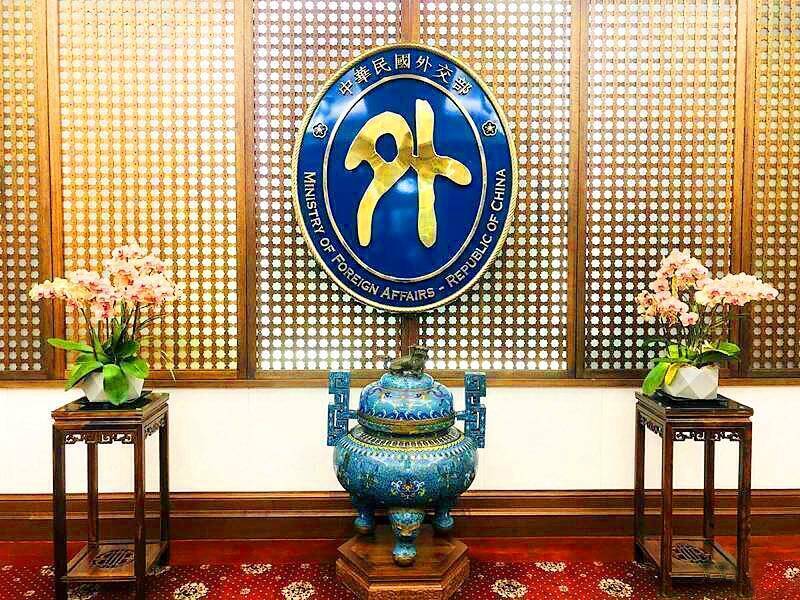The Ministry of Foreign Affairs (MOFA) has decided to create a new “ambassador-at-large” position, to allow diplomats who are returning to Taiwan after being posted overseas for years to continue working on important diplomatic projects, a diplomatic source said yesterday.
According to a set of guidelines on a post released on Nov. 15, senior diplomats who are consul-generals and counselors on home assignments are eligible to serve as ambassadors-at-large and handle special diplomatic projects.
The ambassador-at-large has been appointed by the president since 1998. The post has been filled by non-civil servants who specialize in certain fields to promote Taiwan’s diplomacy around the globe.

Photo: Taipei Times
Unlike a diplomat in residence, who is usually limited to a country or embassy, the ambassador-at-large is typically entrusted with operating in several neighboring countries or a region.
An ambassador-at-large might even be specifically assigned to advise and assist the government on issues. Taiwan currently has ambassadors-at-large for religion and cyber affairs.
The new ambassador-at-large position is intended for diplomats rather than non-civil servants, said a diplomatic source familiar with the matter, who did not want to be named.
Minister of Foreign Affairs Lin Chia-lung (林佳龍) is hoping that the diplomats in the new posts would be responsible for specific projects, including opening or reopening overseas offices, Taiwan’s participation in international organizations, trade deal talks and non-governmental organization exchanges, among others, the source said.
The main reason the new posts were established is that most of diplomats have first-hand experience overseas, with rich connections and language skills, but do not have a place to exercise their talents after returning to ministry headquarters in Taipei, because many posts have already been filled, the source quoted Lin as saying.
The new project is expected to give them plenty of opportunities to make use of their diplomatic experience and connections, the source cited as Lin saying.

Taiwanese can file complaints with the Tourism Administration to report travel agencies if their activities caused termination of a person’s citizenship, Mainland Affairs Council Minister Chiu Chui-cheng (邱垂正) said yesterday, after a podcaster highlighted a case in which a person’s citizenship was canceled for receiving a single-use Chinese passport to enter Russia. The council is aware of incidents in which people who signed up through Chinese travel agencies for tours of Russia were told they could obtain Russian visas and fast-track border clearance, Chiu told reporters on the sidelines of an event in Taipei. However, the travel agencies actually applied

Japanese footwear brand Onitsuka Tiger today issued a public apology and said it has suspended an employee amid allegations that the staff member discriminated against a Vietnamese customer at its Taipei 101 store. Posting on the social media platform Threads yesterday, a user said that an employee at the store said that “those shoes are very expensive” when her friend, who is a migrant worker from Vietnam, asked for assistance. The employee then ignored her until she asked again, to which she replied: "We don't have a size 37." The post had amassed nearly 26,000 likes and 916 comments as of this

New measures aimed at making Taiwan more attractive to foreign professionals came into effect this month, the National Development Council said yesterday. Among the changes, international students at Taiwanese universities would be able to work in Taiwan without a work permit in the two years after they graduate, explainer materials provided by the council said. In addition, foreign nationals who graduated from one of the world’s top 200 universities within the past five years can also apply for a two-year open work permit. Previously, those graduates would have needed to apply for a work permit using point-based criteria or have a Taiwanese company

The Shilin District Prosecutors’ Office yesterday indicted two Taiwanese and issued a wanted notice for Pete Liu (劉作虎), founder of Shenzhen-based smartphone manufacturer OnePlus Technology Co (萬普拉斯科技), for allegedly contravening the Act Governing Relations Between the People of the Taiwan Area and the Mainland Area (臺灣地區與大陸地區人民關係條例) by poaching 70 engineers in Taiwan. Liu allegedly traveled to Taiwan at the end of 2014 and met with a Taiwanese man surnamed Lin (林) to discuss establishing a mobile software research and development (R&D) team in Taiwan, prosecutors said. Without approval from the government, Lin, following Liu’s instructions, recruited more than 70 software